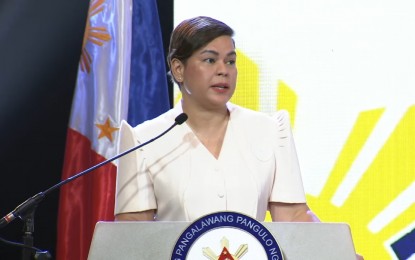
STRENGTHENING BASIC EDUCATION. Department of Education Secretary Vice President Sara Z. Duterte leads the launch of the MATATAG Curriculum at the Sofitel Hotel in Pasay City on Thursday (August 10, 2023). Duterte said the revised basic education curriculum is tailored to produce competent, job-ready, active, responsible, and patriotic citizens. (Screenshot from DepEd YouTube livestream)
MANILA - Department of Education Secretary and Vice President Sara Z. Duterte vowed that the current K to 12 Curriculum will be decongested by the MATATAG Curriculum which was officially launched on Thursday at the Sofitel Hotel in Pasay City.
In her speech, Duterte cited revisions in the new basic education curriculum which include the reduction in the number of competencies, and more focus on development of foundational skills such as literacy, numeracy, and socio-emotional skills to kindergarten to Grade 3 learners.
She also cited the intensified formation of learners' values and character development in adherence to the Good Manners and Right Conduct (GMRC) and Values Education Act as well as the articulation to 21st Century Skills.
She said among the features of the MATATAG Curriculum are the peace competencies highlighting the promotion of non-violent actions, and development of conflict resolution skills.
"This curriculum will be integral in DepEd's MATATAG Agenda unveiled in January this year. DepEd's track remains to be fundamentally illuminated by the wisdom of our slogan 'MATATAG: Bansang makabata, batang makabansa', meaning DepEd's programs and reforms are intentionally tailored to produce competent, job-ready, active, responsible, and patriotic citizens," Duterte said.
"MATATAG" stands for "MAke the curriculum relevant to produce job-ready, active, and responsible citizens; TAke steps to accelerate the delivery of basic education services and provision facilities; TAke good care of learners by promoting learner well-being, inclusiveness learning, and positive learning environment; and Give support for teachers to teach better."
Duterte noted that the review of the K to 12, which was started during the time of former DepEd Secretary Leonor Briones, was an "extensive and painstaking" process that demanded the collaboration of education stakeholders.
"Pursuing these reforms has been marked by foresight and demonstrated DepEd's desire to change the learning landscape of the Philippines for the sake of the future of our learners," she said.
In her presentation, DepEd Bureau of Curriculum Development Director Jocelyn Andaya said the review, which took them two years, was able to decongest the curriculum by 70 percent.
Andaya said it includes developing and drafting of Shaping Papers and Curriculum Guides, which were validated, revised, and went through a public review before being finalized.
"After going through the revision process, we have subjected the curriculum to a public review, which I have previously mentioned, is something novel as this is the first time that a national curriculum was subjected to public scrutiny," she said.
"Shaping Papers gained 96 percent public approval rate in a survey with 4,843 respondents which includes students, teachers, public/private school owners, government agencies, private organizations, and non-government organizations," she added.
The review, Andaya noted, was guided by the curriculum review findings, international large-scale assessments and benchmarks, as well as the MATATAG Education Agenda.
The Philippines adopted the K to 12 Program by virtue of Republic Act 10533 which aimed to enhance the Philippine Basic Education System by strengthening the curriculum and increasing the number of years of basic education from 10 years to 12 years.
Before the implementation of K to 12, the Philippines had been one of the only three remaining countries in the world, the other two being Djibouti and Angola, to have 10 years of basic education.
The phased implementation of K to 12 was adopted starting in School Year (SY) 2011-2012 and was implemented in the succeeding years, where Andaya admitted the DepEd "hit snags."
She also noted that the shifting local and global landscapes created an impact in various sectors, including education.
The review's findings, Andaya said, include congested curriculum content, misplaced prerequisite learning competencies, and cognitive demand imbalance.
The DepEd announced that the MATATAG Curriculum will be implemented in SY 2024-2025 for Kindergarten, Grades 1, 4, and 7.
In SY 2025-2026, Grades 2, 5, and 8 will be under the new curriculum with Grades 3, 6, and 9 in SY 2026-2027. Grade 10 learners will join them on SY 2027-2028. (PNA)
